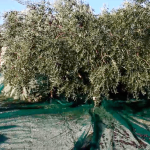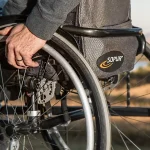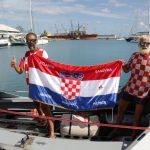January 22, 2020 – With more than half a million registered war veterans, TCN meets a foreign vet wounded 5 times in the Homeland War, living out his pension in Krapina.
Last November, TCN owner Paul Bradbury attended a rather unusual barbecue in eastern Croatia. The venue was an English pub in a field in the middle of nowhere outside Vinkovci, the guests all foreign veterans from the Homeland War, men who had volunteered to fight for Croatia. The barbecue was hosted by Steve Gaunt, a foreign vet from Leeds who now lives in Vinkovci, and his guests gathered – as they did every year – on the evening of November 18, having earlier taken part in the Vukovar Remembrance Parade. You can read about the barbecue here.
Among the foreign vets was a man from the north of England called Nigs Balchin, who volunteered to fight, was wounded several times, eventually became a Croatian citizen and received a war veteran’s pension. He lives in Krapina, and we had a very interesting chat about his time in Croatia. I was shocked to hear that his pension has been dramatically reduced, so much so that is it not sufficient for the month. This, in a country where new veterans appear on the list almost 25 years after the end of the war, and Croatia now has more than 500,000 veterans. An incredible number, and one which has given more than a little idle speculation to the existence of a number of fake veterans.
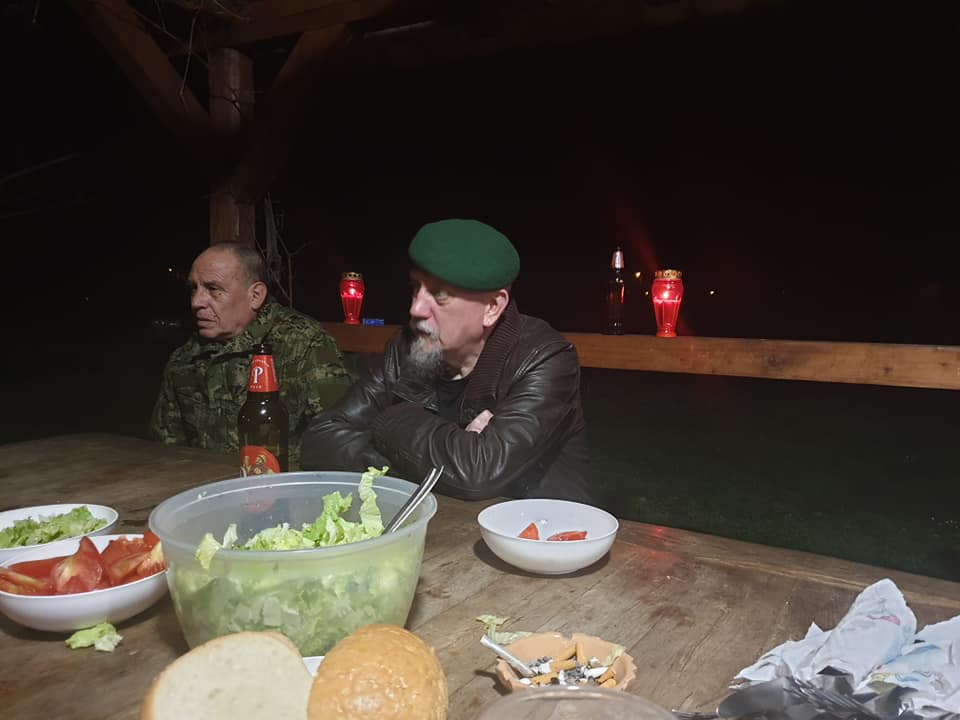
(Nigs Balchin at the November 18 barbecue where TCN first met him)
We decided to follow up the story with Nigs Balchin. Janja Sestak, one of our new TCN interns from Zagreb University, was doing a story for us from Krapina, and she met with Nigs to learn more of his story, which you can read in the interview below.
1. How did you first get involved in the war? Did you have a Croatian connection?
To be honest, I don’t think I would have been able to point out Croatia, or Yugoslavia, on a map at the time. If I had to, I would have probably pointed it somewhere closer to the UK. No, I didn’t have any previous connection with Croatia, but when I saw what was happening on the news, it was wrong, and I wanted to help. So I came over. I was 27 years old.
2. What was the extent of your previous military training?
I had a little military training but nothing much. I was a member of the TA (Territorial Army), but only on a temporary basis. I trained with the TA every Tuesday evening after work for 14 months.
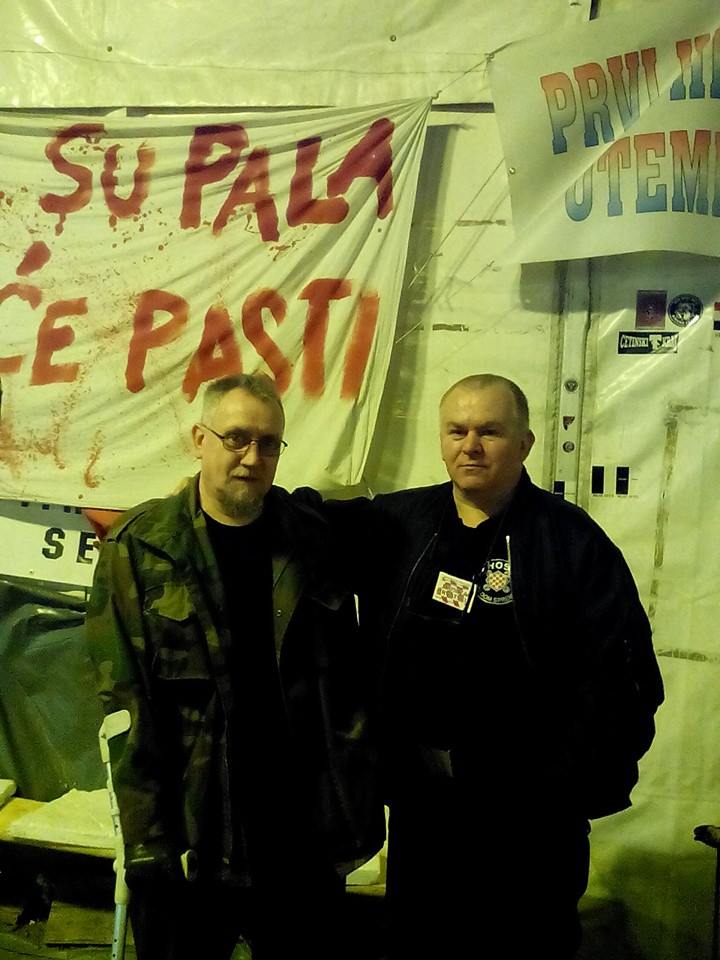
3. There has been a lot of talk about mercenaries fighting for Croatia. Were you a mercenary? Did you know of others who were?
No, I was not a mercenary. I did meet some who were, however, several of them between contracts.
4. Tell us how you found the unit you fought for, and where did you fight?
When I arrived at Pleso Airport, I was asked if I was here for business or pleasure.
“I came to volunteer.” They let me pass, but I got no directions on where to go. In Zagreb, I tried to contact the army, but nobody knew about a division for foreigners. I was sent over to HOS (Croatian Defence Force, the paramilitary arm of the HSP party). There were three teenagers dressed in black in front of the large building, all armed with pistols. The taxi driver explained that I had come to volunteer.
“So you want to shoot Cetniks like John Wayne?” he asked me as he pulled his gun out and pointed right in front of my nose.
“Not with you, mate,” and he turned around, called the taxi driver back and headed together to the train station. There he went in search of a policeman, as he thought he would get more reliable information. But information was conflicting, and he was told to go to Slavonski Brod, while a foreigner in front of him was told to go to Vukovar.
His first unit was an independent group called Bura in HVO 103 Brigade, in June 1992. He got a Kalashinkow, was told how to strip it, clean it, and reassemble it. He did that three or four times, and that was his training.
Next Monday at 7 a.m., they were out there, in front of their lines, leading a 200-foot line of soldiers around a hill. They had to meet tanks and armoured vehicles, which were going the other way around the hill. It didn’t work. It was nice and dry weather. One tank driver from Slavonski Brod realized that he should drive his tank over the field which had just been ploughed. If he did that, he would have to clean his tank. So rather than going across the field, he turned his tank and went back. When other tank drivers and commanders saw that one guy was turning back, all of them turned back. All of a sudden, there was no army on one side of the hill. Nigel and other soldier came from their side and found out they were all alone. Serbs start to shoot from the hill. Nigel and his division had to crawl back.When everybody came back, 25 names were missing. One tank caused 25 deaths. He was never accused for that. But Nigel met him in Slavonski Brod, among his people and yelled “Coward!” at him. He told him how he is responsible for the death of 25 people. He started arguing, but in the end, he couldn’t do anything but cry.
In Bosnia, we didn’t listen to their radio because it was all lies. We were listening to German radio, they told the truth. The Germans said on the radio there was an attempted attack by HVO forces and that there were so many killed and so many captured and other details. Serbs in Bosnia would give false information. “There were cases when we had actions in Domaljevac, and we would shoot Četniks with mortars. They would say on the radio that all of the victims were civilians, women and children. After a while, we would hear on the radio from Frankfurt that 3 Bosnian soldiers were killed and 2 wounded. Propaganda…”
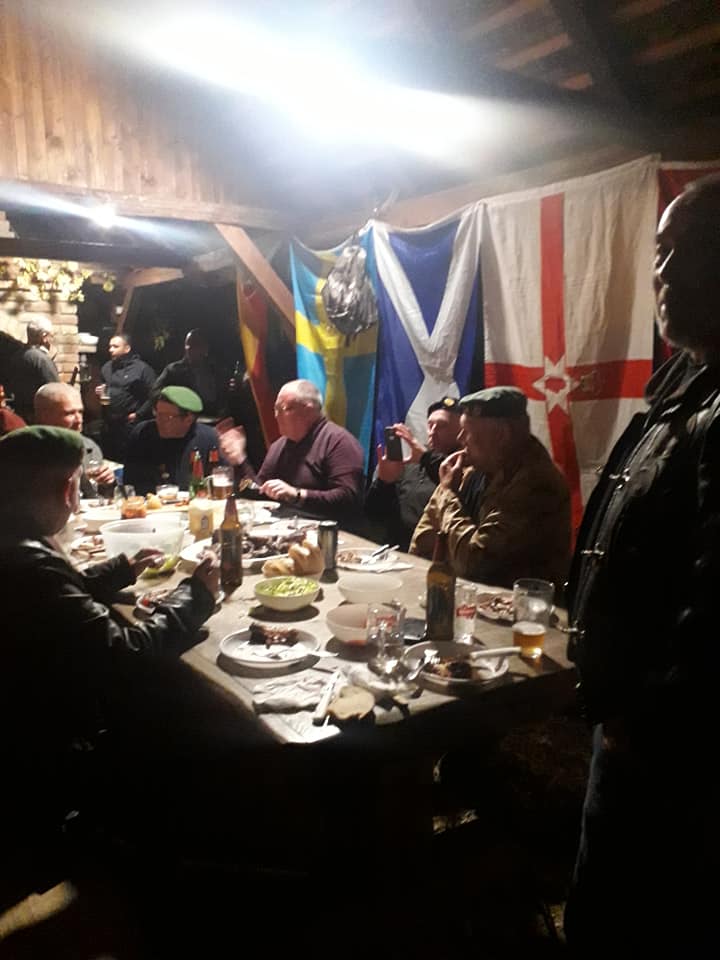
5. You were wounded during the war. Tell us what happened?
I was wounded five times, but they only accepted 4 officially. Four times in 103. Brigade Derventa, and once in 104. Brigade Bosanski Šamac. The first wound was after just two weeks. It was a dislocated ankle. As someone stole my boots and we had to jump from a decent height in one action, I dislocated my foot. I couldn’t walk, I was helping myself with a rifle, but I was constantly falling down.
The second injury was in Koraće, and I was knocked out, so I don’t remember it. 103rd and 101st Brigade, they both had a report of the incident, but they are completely different. 101st Brigade had that I was attacked by military police and beaten up by them. 103rd Brigade had said I was close to the explosion and being hit by debris. I had injuries on my shoulders, writs, all down my back.
The third injury was in Slavonski Brod with the shrapnel to the arm, elbow, chest, stomach. I was seven days in hospital. Six days they left the wounds open. I had a reputation in Slavonski Brod of disappearing. I lay there twice and that room was in the basement with just one light. I wanted a cigarette, but at the same time, one mortar bomb landed on the hospital. As if that was going to stop me. So I went out of my room, sat on the stairs, and lit a cigarette. And everybody went crazy like, where is the Englishman? I sat there, smoking a cigarette, watching a damage control team checking out what damage the mortar did to the wall. All of a sudden, there was a nurse behind me. She started to shout at me because I’m went missing. I was like: “I’m having a cigarette, would you mind? Every time I am missing, I’ll be here, having a cigarette.”
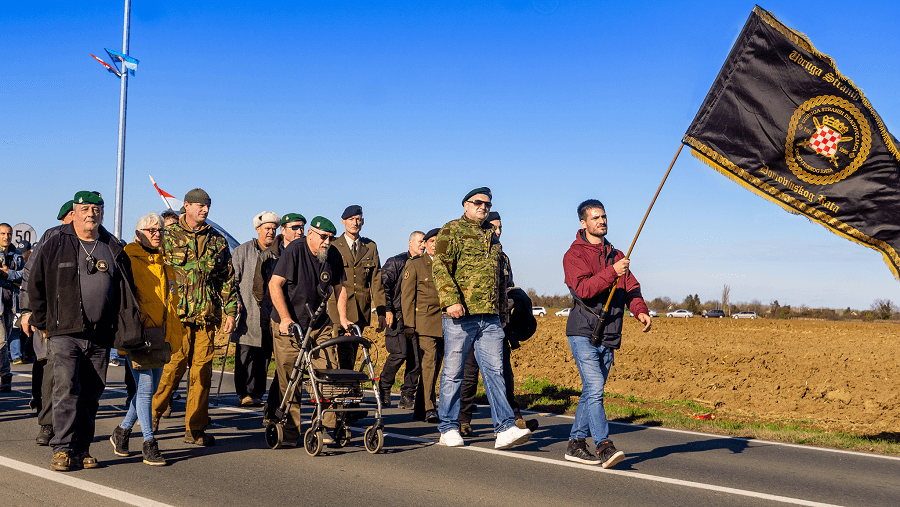
The treatment in hospital was very good, and I even got a marriage proposal at that time from a nurse. She was a nurse with whom everybody fell in love with. But she wanted to marry me and go to England with me. I was here for the war and told her we can get married, but I won’t go to England until the war is over. So the answer in that time had to be no. I didn’t want to mix emotions because I saw what it did to the people on the front line when they had a family right behind the front line.
The fourth injury were the eyes. For a few months, I was with 106th Brigade. My unit was in southern Hercegovina. We were in a small bunker with two huge slits and no chance for a fire. In the night, when temperature hits minus 20 degrees, you need some heat. We stuffed blankets in these slits, and then we could make a fire. But there was a risk of snipers… So as I was responsible for this fire, all of a sudden, it somehow exploded in my eyes. I couldn’t open my eyes, and I needed to be taken out of the bunker. As we got to the ambulance, they tried to check my eyes, but they couldn’t. I was sent to the Red Cross, then in Tolisa in Monastir. They checked my eyes but still couldn’t see if there was some damage. So they put me some big cotton bandage and sent me to Slavonski Brod where they did a bunch of tests. It turned out I just had to wait until burnings stop. Even today, I have a problem with the wind which causes me teary eyes.
The fifth wound was the left knee, and I got damage on the ligaments and nerves, but this one was not accepted.
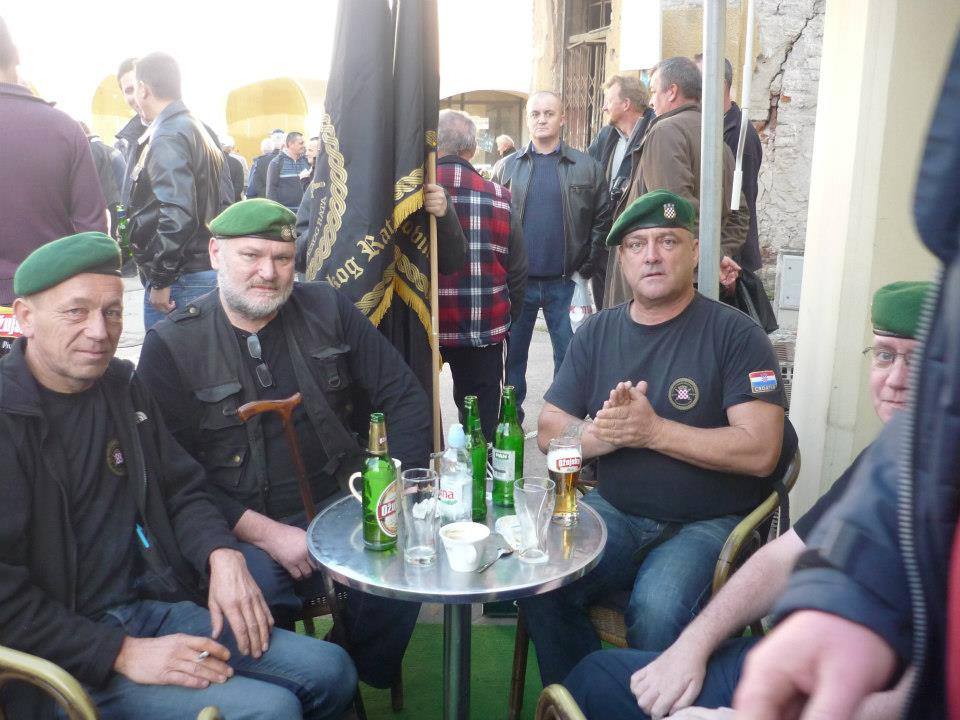
(Nigs Balchin, far right, with other foreign vets on Vukovar Remembrance Day 2019)
6. Moving to after the war, what compensation did you receive from the Croatian State?
I got a pension and citizenship in 1999, and a flat in 2007. The first commission gave me 70% invalidity, which was confirmed both from HVO and HV. In 1995, I was transferred from HVO to HV. Somebody in the Ministry of War Veterans (Ministarstvo branitelja) did that. I don’t even know who started the process for that. I just became a member of HV. But it was quite a disadvantage because in HVO I received HRK 2500 and in HV I got HRK 1400. I couldn’t survive with this amount of money for a whole month. I was like a tennis ball. They keep sending me from Zagreb to Orašje, then from Orašje to Zagreb. Since I was living in Đakovo, I had to pay rent, food, and other stuff. Constantly traveling to Zagreb cost me too much money, so I moved to Zagreb. I went to the military base Borongaj and stayed there in what they called “Sobe prolaza”. I was there for a few days nobody said anything. But then one officer saw me and asked me who I was. I told him and he gave documentation to this commander officer. Since I didn’t even know that I needed permission to be there (I did not have any), I had to left the base. I tried to ask the officer where can I get this permission, but officers just showed me the door and said: “Get out and never come back.”
He ended on the streets without any money and had nowhere to go. He knew nobody in Zagreb. Nigel spent a few nights on the streets.
Then Mario Kirin arranged some lodging at the Red Cross for him. He was in Sesvete for three months, but the money wouldn’t last for the whole month. One of his friends (Scottish) who in that time lived in Krapinske Toplice, had a word with Vojna skrb in Krapinske Toplice. They found him a place to sleep, eat meals in hospitals etc., almost like in base in Borongaj. So he moved in Krapinske Toplice and stayed there for five years and then moved to Krapina. He became a member of a baptist church in Krapina in 1998.
7. And what recognition of your sacrifice for the war effort?
One thing I learned very quickly when I came here is that there is no capitalist like a communist. I met them mostly in bureaucracy. A lot of people there still lived in the Yugoslavia dream. I especially had a bad experience in Vojna skrb, Ilica 210, who acted just like they were still in Yugoslavia. Their attitude was like I was there to serve them, not the other way around. The identical thing was in the workshops. Vojna skrb in Krapinske Toplice was 100% awesome. One woman who worked there (in Vojna skrb Krapinske Toplice) wrote to me on the paper exactly where I had to go, who I needed to search for etc. and gave this to me. I took this paper, went to Ilica 210, and said: “I’m looking for this person.” When I came to the person I was searching for, I gave him the paper with all of the information. But that woman told me: “No, no, no, I am not the person you need, I don’t know what are you talking about.” (She was, but she was too lazy to get this job done.) “You have to go to this place, the reason is well… Okay, but change it to this, and blablabla.”
I didn’t know the Croatian language well, so I kindly asked that woman to write me down where I have to go. But again, she was too lazy to do that, so instead of this, repeat these instructions on Croatian to an Englishman. Several times… When her boss arrived, she admitted with no shame what she had done.
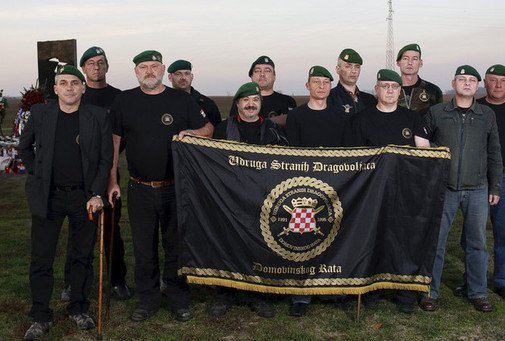
8. Your pension has been reduced in recent years – why?
I could say that I got recognition by the fact they looked at my case and decided to reduce my pension. That was the time of great revisions. Every year or two, they would revise war invalids (their percentages and their pensions) because there were a lot of fake war invalids. These fake invalids paid somebody to get a pension. I was going through the process at that time, and they reduced my invalidity by 60%. And then again to 50%. I was talking to the doctors in Krapinske Toplice, and they said I should get 80% or 90%. Then, when I got a pension, the Ministry of Defence didn’t want to sign my paper. They reduce my invalidity to 55% so they could say to the others: “Look! We don’t pay them as much as you think!” They did it because I am a foreign, with no influence friends or family here. They literally cut my pension and gave it to the fake war invalids. So I ended up with 50% invalidity and a small amount of pension. I was again on HRK 2500.
9. As your pension is reduced, the number of war veterans increases every year, now over 500,000 – how do you feel about that?
I am not angry or frustrated, I am just sad that people with fake invalidity exist.
10. Tell us about your efforts to reassess your pension.
Every war invalid has a right to apply every six months to have his invalidity reassessed. I started asking around what I need to do, but apparently, nobody knew. It took me six months to gather all of what I needed. When I made an application for invalidity reassessment, they told me that I needed to give them everything from that day up to now. All documents from 1992 to this day. With the help of Mario Kirin, I wrote a complaint letter and handed it to the Upravni sud court in Zagreb. It took them two years, and during those two years, no alternation in status was permitted. For those 2 years, I was stuck on HRK 1400. It came out that they found out that the medical commission didn’t consider the evidence objectively. They found out that the percentage was too low, and it needed to be revised immediately. So, I handed out that to the Ministry, and they sent it to the medical commission for the new assessment. What they did was they removed diagnoses. I had 14-15 diagnoses in the beginning, and they removed 3 or 4 and gave me 50% of invalidity, but this time permanently. I realized that working out with the Ministry of Defence is like working with mafia.
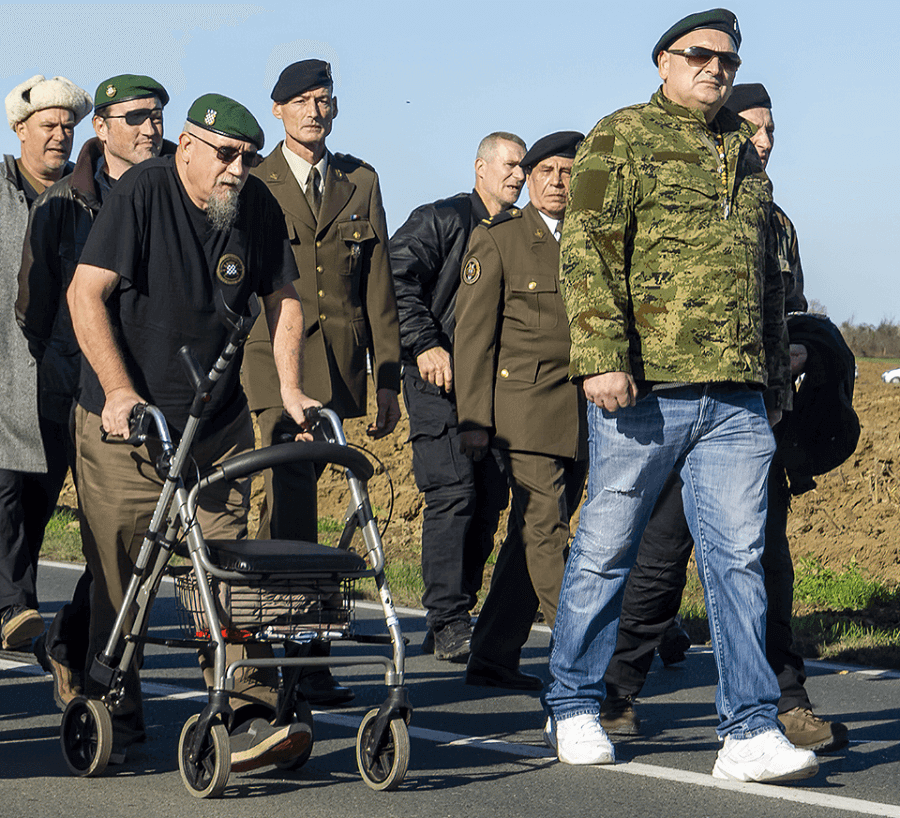
11. You applied for 10% extra based on your PTSD, too. How did that go?
Yes, in 2001, I made an application for 10% extra for invalidity based on PTSD. I got a message that I had to revoke that application, or I would lose everything. My pension, my citizenship, and I would be kicked out of the country by the Ministry of Defence. Everybody who I knew and who I contacted about this problem, said to me: “Revoke it. They are too powerful. There is nothing you can do.” I got a friend to come with me to the office for war veterans as a witness. There was a woman who said to us that is entirely true. She went to the other room, came back 30 seconds later with the printed version of my revoking statement, and all I had to do was signed it. She didn’t have to type anything. It was ready for me to walk in. I just signed it, and that was it.
12. Looking back, almost 30 years later, what are your reflections on what you fought for. Would you do it again?
I have no regrets about coming, I would do it all again. I don’t consider or look at most Croats in the same way as the bad ones. The bad ones are a small percentage of Croatia, but unfortunately, a percentage with the possibility to harm me. However, if it weren’t for the good ones, I wouldn’t survive the bad ones.

